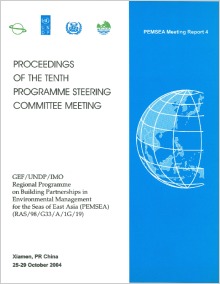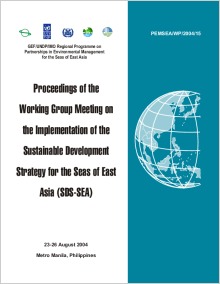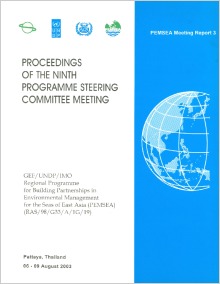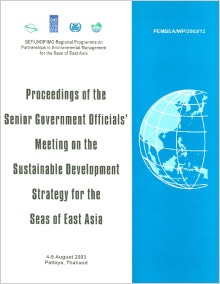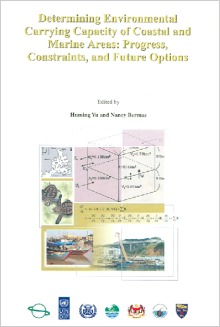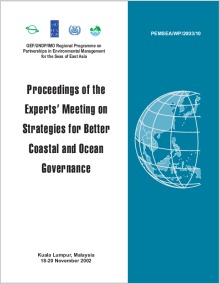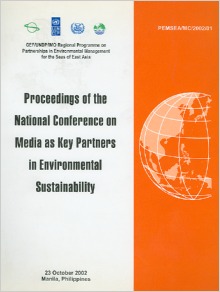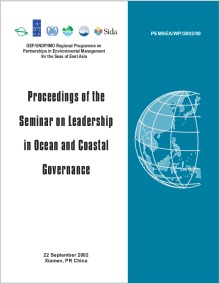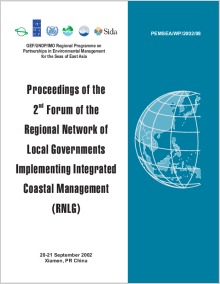
Breadcrumb
Proceedings of the Tenth Programme Steering Committee Meeting
This publication summarizes the results of the Tenth Programme Steering Committee (PSC) Meeting of the GEF/UNDP/IMO Regional Programme on Partnerships in Environmental Management for the Seas of East Asia (PEMSEA), held at the Best Western Xiamen Central Hotel, Xiamen, PR China, from 25-29 October 2004. The State Oceanic Administration of PR China (SOA) and the Municipal Government of Xiamen hosted the Meeting. The 10th PSC Meeting highlighted the 10-year history of the Regional Programme, provided a comprehensive review of its progress, as well as outlined major achievements, financial delivery, and constraints with regard to the implementation of the Regional Programme. The Meeting was attended by delegates from participating countries namely, Cambodia, People’s Republic of China, Democratic People’s Republic of Korea, Indonesia, Japan, Malaysia, Philippines, Republic of Korea, Singapore, Thailand and Vietnam. Observers represented at the Meeting were the Lao PDR, Myanmar, Timor Leste, United Nations Environment Programme (UNEP), World Wide Fund for Nature (WWF), East Asian Response PTE LTD (EARL), Global Ballast Water Management Programme, Victorian Coastal Council, and the GEF/UNDP Yellow Sea LME Project. A resource person also participated in the Meeting.
Proceedings of the Working Group Meeting on the Implementation of the Sustainable Development Strategy for the Seas of East Asia (SDS-SEA)
Following a Preparatory Meeting for the Working Group on the Implementation of the SDS-SEA that was held on 29 March–1 April 2004, in Chengdu, China, a Working Group meeting was organized by the PEMSEA Regional Programme Office (RPO) and hosted by the Department of Environment and Natural Resources (DENR), in Manila, Philippines, from 23 to 26 August 2004. Participants at the meeting included representatives from 10 participating countries, along with two resource persons and representatives from UNDP, World Bank and the Secretariat. This report contains the proceedings of the Meeting, which includes discussion on SDS-SEA implementation such as targets, approaches, modalities and funding implications, taking into account the specific national and local conditions.
Proceedings of the Ninth Programme Steering Committee Meeting
This publication summarizes the results of the Ninth Programme Steering Committee (PSC) Meeting of the GEF/UNDP/IMO Regional Programme on Partnerships in Environmental Management for the Seas of East Asia (PEMSEA), held at the Dusit Resort, Pattaya, Thailand, from 6 to 8 August 2003. The Government of Thailand hosted the Meeting. The Meeting was attended by delegates from twelve participating countries -- namely, Brunei Darussalam, Cambodia, Democratic People’s Republic of Korea, Indonesia, Japan, Malaysia, People's Republic of China, Philippines, Republic of Korea, Singapore, Thailand and Vietnam. Observers represented at the Meeting were the Association of Southeast Asian Nations (ASEAN) Secretariat, East Asia Response Pte. Ltd (EARL), International Ocean Institute (IOI), International Association of Independent Tanker Owners (INTERTANKO) and the United Nations Environment Programme - Coordinating Body on the Seas of East Asia (UNEP-COBSEA). The 9th PSC Meeting considered and reinforced the recommendations of the Senior Government Official Meeting (SGOM) with respect to the endorsement of the SDSSEA, the Declaration and the Programme for the Ministerial Forum on December 2003. The PSC also considered the recommendations of the Mid-Term Evaluation for PEMSEA.
Proceedings of the Senior Government Officials' Meeting on the Sustainable Development Strategy for the Seas of East Asia
The Senior Government Officials' Meeting (SGOM) on the Sustainable Development Strategy for the Seas of East Asia was held at the Dusit Resort, Pattaya, Thailand, from 4 to 5 August 2003. It was organized by the Regional Programme Office (RPO) in collaboration with the Marine Department, the Royal Government of Thailand. The Meeting was held to finalize the draft third revision of the Sustainable Development Strategy for the Seas of East Asia (SDS-SEA) and the draft Declaration of Regional Cooperation on the Sustainable Development for the Seas of East Asia, for their endorsement by the countries and adoption by the Ministerial Forum to be held on 12 December 2003. Represented at the SGOM were the twelve PEMSEA participating countries, namely Brunei Darussalam, Cambodia, Democratic People’s Republic of Korea, Indonesia, Japan, Malaysia, People's Republic of China, Philippines, Republic of Korea, Singapore, Thailand and Vietnam, as well as the executing agency of PEMSEA, the International Maritime Organization (IMO) and its Regional Programme Office (RPO).
Determining Environmental Carrying Capacity of Coastal and Marine Areas: Progress, Constraints, and Future Options
This publication presents the summary of the proceedings of the workshop and the key technical/scientific papers presented during the two-day event. It discusses the concept and approaches, methodologies, application and case studies, research needs and priorities in environmental carrying capacity or effective/permissible carrying capacity in tourism (ECC) research. The recommendations focus on the roles of the policymakers, scientists, and research managers and provide useful insights and future opportunities in advancing ECC research and application. It is hoped that through this effort, better cooperation in terms of sharing knowledge and research outputs among the countries in the East Asian region and with other parts of the world would be promoted.
Proceedings of the Experts’ Meeting on Strategies for Better Coastal and Ocean Governance
The Experts’ Meeting on Strategies for Better Coastal and Ocean Governance was held in Kuala Lumpur, Malaysia, on 18-20 November 2002. The Meeting was organized to review strategies to address priority coastal and ocean governance issues at subnational, national, and regional levels; and examine measures to develop a regional pool of expertise in coastal and ocean governance. The meeting has taken into account the outcomes of high-level policy fora related to coastal and marine affairs, particularly those from the recent APEC Ocean Ministerial Meeting (Seoul, 25-26 April 2002) and the World Summit on Sustainable Development (WSSD, Johannesburg, 26 August to 4 September 2002). In addition, the meeting forms part of the technical preparation for the Ministerial Forum on the Sustainable Development of the Seas of East Asia and the International Conference on the Sustainable Development of the East Asian Seas: Towards a New Era of Regional Collaboration and Partnerships to be held on 8-12 December 2003. The meeting was co-organized by PEMSEA and the Maritime Institute of Malaysia (MIMA). Experts with diverse disciplinary backgrounds from the different countries of East Asia representing government and nongovernment institutions (specifically Indonesia, Japan, Malaysia, P.R. China, Philippines, Republic of Korea, Singapore, Thailand and Vietnam), participated in their individual capacities in the meeting. Also participated were experts from other institutions in the region such as the Asia Pacific Centre for Environmental Law and the United Nations Development Programme.
Proceedings of the National Conference on Media as Key Partners in Environmental Sustainability
The National Conference on Media as Key Partners in Environmental Sustainability was held in Manila, Philippines, on 23 October 2002.
The Conference was organized by the GEF/UNDP/IMO Regional Programme on Partnerships in Environmental Management for the Seas of East Asia (PEMSEA), in collaboration with the United Nations Development Programme, Department of Environment and Natural Resources, Environmental Broadcast Circle, Manila Bay Environmental Management Project, Batangas Bay Demonstration Project and BIGKIS-Bataan Project.
The Conference was conceptualized to enhance partnerships with media and other communication practitioners in the Philippines in working for environmental sustainability; and identify ways and mechanisms of strengthening media coverage of environmental issues in the Philippines, including those tackled by the Manila Bay Environmental Management Project, Batangas Bay Demonstration Project and BIGKIS-Bataan Project.
Sixty-four media and communication practitioners, and representatives/staff from national and local governments, international organizations, project management offices and the Regional Programme Office, participated in the activity.
Proceedings of the Seminar on Leadership in Ocean and Coastal Governance
The Seminar on Leadership in Ocean and Coastal Governance was held in Xiamen, PR China, on 22 September 2002. The Seminar was organized by the GEF/UNDP/IMO Regional Programme for Partnerships in Environmental Management for the Seas of East Asia (PEMSEA), jointly with the State Oceanic Administration (SOA) of PR China, and hosted by the Xiamen Municipal Government of PR China. The Seminar was designed for local leaders implementing integrated coastal management (ICM) as well as national leaders involved in ocean and coastal governance. It aimed at building regional leadership and commitment in fostering regional collaboration for the sustainable use and protection of the remaining ocean heritage. In light of global commitments reaffirmed at the World Summit on Sustainable Development in Johannesburg on August 2002 toward achieving the goal of sustainable development and implementing Agenda 21, the Seminar provided a timely and useful gathering among regional leaders to share their concerns, issues and visions for environmental management and sustainable development of the Seas of East Asia. The Seminar was attended by 88 participants including high-level officials, present and former ministers, vice ministers, governors, vice governors, mayors, vice mayors, director-generals and directors of line agencies of national and local governments from ten countries of the East Asian Seas region and three countries outside of the Region, as well as senior officials from private sector and four international/UN agencies, such as GEF, UNDP Manila, World Bank and UNIDO.
Proceedings of the 2nd Forum of the Regional Network of Local Governments Implementing Integrated Coastal Management (RNLG) (Xiamen, PR China : 20-21 September 2002)
The Second Forum of the Regional Network of Local Governments Implementing Integrated Coastal Management (RNLG) was organized by the GEF/UNDP/IMO Regional Programme for Partnerships in Environmental Management for the Seas of East Asia (PEMSEA), jointly with the State Oceanic Administration (SOA) of PR China, and hosted by the Xiamen Municipal Government of PR China. The Forum was designed to provide a venue to the respective local governments of participating countries for evaluating progress, achievements, constraints and lessons learned in ICM program development and implementation in their respective demonstration and parallel sites; sharing the experience, lessons and good practices of Xiamen ICM demonstration site; and discussing network operational modality and future activities.
